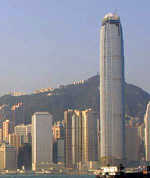Commentary: Miscalculation of public opinion
( 2003-07-10 09:12) (China Daily HK Edition)
The SAR government's deferral of the second reading of the National Security (Legislative Provisions) Bill and its incipient review of deficiencies in its governance have allowed Hong Kong society to calm down and contemplate the major issues of stability and development.
 Yet the "democrats", instead of stopping there, are trying to go one step further - calling for the shelving of the bill and resignation of the chief executive and certain accountable officials. Yet the "democrats", instead of stopping there, are trying to go one step further - calling for the shelving of the bill and resignation of the chief executive and certain accountable officials.
The "democratic" camp's perseverance is based on their inaccurate assessment of public opinion. That half a million people took to the streets on July 1 has made them a little complacent, believing that the 6.8 million Hong Kong people will follow them all the way in their demand for the recalling of the bill and the stepping down of Tung and other officials. That is a grave miscalculation.
Those who took part in the mass protest asked for a variety of things and only a minority of them really opposed Article 23 legislation. According to the figures released by a newspaper, this minority numbered only about 240,000. Many of them were just not satisfied with the way the bill was presented to them and hoped for a longer period of consultation; but they were not opposed to the basic principle that laws must be enacted to safeguard national security.
Now that the government has decided to make amendments to the three most controversial provisions upon the basis of the extensively amended blue bill; and to defer the second reading of the bill so as to allow more time for fresh rounds of public consultation, it can be said that the government has responded fully to people's wishes. The plan of the "democrats" to shelve the legislation will not be able to win the support of mainstream opinion.
Dissatisfaction with the government's rule and longing for better governance was certainly the prevailing sentiment of the crowd on July 1. However, the vast majority of them did not want to see their expression of opinion turned into a political storm that would paralyze the government and throw it into a ruling crisis. That was because such a development would inevitably compromise social stability and economic recuperation, cause worry in the international community and jeopardize the business environment and development prospects.
The chief executive has already said openly that he has noticed people's discontent with the SAR government and himself in particular and that he appreciates their feelings. He pledged to undertake serious reviews in future, answer people's questions in detail and enhance the government's work. We believe that the community will accept this attitude of Tung and the intention of the "democrats" to take advantage of the recent events to topple Tung and his aides will not receive sufficient support from the people.
Since returning to the embrace of the motherland, the SAR has experienced numerous problems - economic trauma, negative equities, a severe fiscal deficit, and high unemployment, which have been aggravated by the government's mishandling of the issues due to inexperience. All these have generated a lot of grievances among the people. That is the main impetus for half a million people joining the protest on July 1.
Nevertheless, Hong Kong people are sensible enough not to attribute all the blame to the chief executive and the government, nor will they confound economic problems with Article 23 legislation. After venting their pent-up feelings, they will come to realize that the most pressing tasks at the moment are post-SARS reconstruction and economic revival, and that social and political stability is the essential pre-requisite.
It is high time for the "democrats" to cool down. The rule of the game is to know where and when to stop. If they cling obstinately to their course of creating disturbance in Hong Kong, they will finally find themselves standing opposed to the people.
|